Trainer Card (game): Difference between revisions
m (→Game Boy and Game Boy Color: green before rb) |
m (→Nintendo DS: apparently weve had an english card this whole time) |
||
| Line 171: | Line 171: | ||
! class="roundytop" style="background:#FFF" | [[File:Trainer Card HGSS 2Star.png|x240px]] | ! class="roundytop" style="background:#FFF" | [[File:Trainer Card HGSS 2Star.png|x240px]] | ||
! class="roundytop" style="background:#FFF" | [[File:Trainer Card BW.png|x240px]] | ! class="roundytop" style="background:#FFF" | [[File:Trainer Card BW.png|x240px]] | ||
! class="roundytop" style="background:#FFF" | [[File:Trainer Card | ! class="roundytop" style="background:#FFF" | [[File:Trainer Card BW2 (Default).png|x240px]] | ||
|- | |- | ||
! class="roundybottom" style="background:#{{sinnoh color}}" | {{color2|FFF|Pokémon Diamond and Pearl Versions|DP}}{{color2|FFF|Pokémon Platinum Version|Pt}} | ! class="roundybottom" style="background:#{{sinnoh color}}" | {{color2|FFF|Pokémon Diamond and Pearl Versions|DP}}{{color2|FFF|Pokémon Platinum Version|Pt}} | ||
Revision as of 00:30, 19 May 2024

|
This article is incomplete. Please feel free to edit this article to add missing information and complete it. Reason: Needs Gen VIII information |

The Trainer Card (Japanese: トレーナーカード Trainer Card, or Trainer's Card) is the screen that displays information about a Trainer in the Pokémon games.
It shows basic information such as the Trainer name, the Trainer ID number, the player's gender, the amount of money carried, the total gameplay time attained so far, the number of Badges obtained, and the number of Pokémon the player has seen or caught in their Pokédex.
In Pokémon Sword and Shield, Trainer Cards are replaced by League Cards.
Terminology
- In Generations I–VI, this is shown as the player name in the menu.
- In Generation I, this screen is referred to as Name (Japanese: 主人公の名前 Player's Name) in the game manuals.
- In Generations II–III, this screen is referred to as Your Name in the game manuals.
- In Generation III, the text Trainer Card (Japanese: トレーナーカード Trainer Card) appears on the card.
- In Generations IV–V, the text Trainer Card (Japanese: Trainer's Card) appears on the card.
- In Pokémon X and Y, the text Trainer Information appears on the card. The same English text is also used in the Japanese version of these games.
- It is referred to as Trainer's Info (Japanese: 主人公の情報 Protagonist Information) in the game manuals.
- In Pokémon Omega Ruby and Alpha Sapphire, no identifying text appears on the card.
- It is referred to as Trainer Card (Japanese: 主人公の情報 Protagonist Information) in the game manuals.
- In Generation VII, this is shown in the menu as the Trainer Passport (Japanese: トレーナーパス Trainer Pass). The Trainer name is not shown in the menu anymore.
- In Pokémon Brilliant Diamond and Shining Pearl, it is referred to as Trainer Card in the menu.
In Pokémon Emerald, a player can upgrade their Trainer Card to a Frontier Pass (Japanese: フロンティアパス Frontier Pass) upon reaching the Battle Frontier. The usual Trainer Card is visibly shown stored inside the Frontier Pass.
In Pokémon Diamond, Pearl, Platinum, Brilliant Diamond, and Shining Pearl, the Trainer Card and the player's badges are stored in the Trainer Case.[1][2]
In the games
All generations
Starting in Generation I, all generations include an image of the player character and the following information:
- Player name
- Money
- Time played
- List of badges
In Generation I, the Trainer ID number is not shown here, unlike later games. The ID number can be seen on the summary of each Pokémon instead.
Starting in Generation II, all generations include this information:
- Trainer ID number
- Pokédex:
- This is the number of captured Pokémon in Generation II and Generation III games, HeartGold and SoulSilver, and Generation VII games.
- This is the number of seen Pokémon instead, in Pokémon Diamond, Pearl, and Platinum, Generation V and Generation VI games.
Generation I
In Generation I, the Trainer Card initially displays the faces of the eight Gym Leaders, except Giovanni's face is obscured as a silhouette with a question mark "?".
In the Japanese games of this generation, the names of all Gym Leaders are also written above their faces (each Japanese name consisting of exactly three katakana characters), except Giovanni's name is written as "---". In the international versions of these games, the Gym Leader names are not written on the Trainer Card, possibly owing to the longer English names.
When the player obtains a Badge, the respective Gym Leader face is permanently replaced by the Badge, and their name (in Japanese games) disappears as well.
Generation II
In Generation II, the Trainer Card initially displays the faces of the eight Johto Gym Leaders. The Kanto Gym Leaders are not shown on the Trainer Card.
In the Japanese and Korean games of this generation, the names of all Johto Gym Leaders are also written above their faces (each Japanese name consisting of exactly three katakana characters). In the international versions of these games, the Gym Leader names are not written on the Trainer Card, possibly owing to the longer English names.
When the player obtains a Badge, it appears together with the Gym Leader face. Unlike the previous generation, their faces and names (the latter in Japanese and Korean games) remain permanently displayed on the Trainer Card.
Generation III
In Generation III, the card can be flipped to the back, and it includes data such as:
- First Hall of FameRS/Hall of Fame DebutFRLGE: The amount of gameplay time that it took for the player to enter the Hall of Fame for the first time.
- Link Cable BattlesRS/Link BattlesFRLGE: The number of times that the player has participated in link battles, including the amounts of wins and losses incurred.
- Pokémon Trades: The number of times that the player has traded Pokémon with other players.
- Pokéblocks with FriendsRSE: The amount of Pokéblocks that have been produced with other players.
- Contests with FriendsRS/Won Contests with FriendsE: The amount of Pokémon Contests with other players in which the player won 1st place.
- Battle Tower & Straight WinsRS: The number of battles won within the Battle Tower, including the player's best streak (amount of matches won consecutively).
- Union Trades & BattlesFRLG: The number of times that the player has participated in trades and battles in the Union Room.
- Berry CrushFRLG: The number of times that the player has participated in the Berry Crush at the Direct Corner.
- Battle Points WonE: The total amount of accumulated Battle Points ever earned by the player to date (excluding any payout Battle Points obtained from the Hoenn Battle Frontier's betting man or from Scott).
In Generation III, the Pokémon Center for Petalburg City and Pewter City contains an NPC who will let players put key words on their Trainer Cards.
In Pokémon FireRed and LeafGreen, a Trainer's party could be photographed via the Pokémon Printer within the Rocket Game Corner in Celadon City and put on the back of the Trainer Card as well (for a fee of $50 per photo). There are four different color options available:
- Normal: Party Pokémon are displayed with their normal colors.
- Black: Party Pokémon are displayed as silhouettes, entirely colored in black.
- Pink: Party Pokémon are displayed with pink hues.
- Sepia: Party Pokémon are displayed in a gray-scale fashion, only utilizing the colors of black, white, and gray.
Trainer Card levels were also introduced in Generation III, and the Trainer Card changes color and gains an additional star according the number of special achievements completed.
Frontier Pass
In Pokémon Emerald, a player can upgrade their Trainer Card to a Frontier Pass (Japanese: フロンティアパス Frontier Pass) upon reaching the Battle Frontier. The Frontier Pass shows a player's Symbols and Battle Points, allows players to view a map of the Battle Frontier, view a recorded match saved at a Battle Frontier facility except for the Battle Pike and Battle Pyramid, or look at the standard Trainer Card.
Upon the player's first entry into Hoenn's Battle Frontier, their Trainer Card will be upgraded into a Frontier Pass by a woman at the entrance. This pass holds the Trainer Card, as well as a small map of the Battle Frontier and the player's records with the Frontier. Saved-up Battle Points, or BP, are listed, as are any of the seven Frontier Symbols the player has won. One battle from within one of the facilities may be recorded and stored on the Frontier Pass, which may be watched or overwritten with another at any time.
Generation IV
Timestamps are now used in the Generation IV Trainer Cards, whereby the date which the game began and the date and time at which the Elite Four were defeated was also added. A small drawing area was also included at the back of the card to allow the Trainer to add their signature.
Utilizing the dual screens of the Nintendo DS, the earned Badges are now displayed separately from the Trainer Card. In Diamond, Pearl, and Platinum, a Badge case was added where Trainers could polish their Badges using the stylus and by touching the Badges they would play a musical note in a C major scale. As the Badges gradually grow dull over time due to the lack of shine, the pitch will change depending on the 'cleanliness' of the Badge. A dull Badge will play a lower note than it would if it were sparkling.
In HeartGold and SoulSilver, Badges are displayed at the upper screen of the Nintendo DS instead. Unlike Diamond, Pearl, and Platinum, the player is able to sign his or her Trainer Card without having to go to a Pokémon Center.
When communicating in the Union Room, players can have the option of viewing each other's Trainer Card. However, the other player's picture will change to an in-game Trainer class of their gender. The Trainer class can be changed by talking to a man in the Oreburgh City Pokémon Center or the Violet City Pokémon Center.
Generation V
In Generation V, the Badges are now shown on a separate screen from the Trainer Card. In Black and White, the Badges can be polished by the stylus and the picture of the corresponding Gym Leader will light up as the Badges become more shiny. In Black 2 and White 2, the Badges can no longer be polished using the stylus.
The Trainer Card now has added features to it. The front of the card allows the player to change their Trainer class and Nature by tapping with the stylus, while the bottom allows a greeting to be entered which will be used when communicating with other Trainers via C-Gear wireless.
The back of the card is divided into two sections: the top keeps track of the player's playtime, the first Hall of Fame debut and a list of other records which include the number of times the player won, lost or traded with other people, the number of Musicals participated, the number of Pass Powers obtained, and the Battle Institute and Poké Transfer high scores. The bottom half of the card allows the player to draw or sign with added functions such as zoom and erase, or even create a 2-frame animation with two halves of the box.
Stars are no longer displayed after increasing the Trainer Card level, but the color of the card will still change when the player has completed certain achievements.
Generation VI
In Generation VI, the Trainer Card is changed and divided into two screens: the top contains the player's name, their ID number, a number of Pokémon the player saw, their money, their Poké Miles, the player's playtime to keep track on, the day that the player first started their adventure, and the first entrance into the Hall of Fame. The bottom screen has Badges but no longer plays a musical note.
Generation VII
In Pokémon Sun, Moon, Ultra Sun, and Ultra Moon, the Trainer Card is replaced with a Trainer Passport (Japanese: トレーナーパス Trainer Pass). It contains the same player's information found in Trainer Cards from previous games. Unlike previous games, the Trainer Passport is not immediately obtained at the start of the game, but instead is obtained just after the player chooses their first partner Pokémon. Whereas previous games also displayed the player's earned Badges and Trainer Card level, the Passport records these as stamps on different pages of the Passport instead. The player is also able to change their Passport portrait at any time.
In Let's Go, Pikachu! and Let's Go, Eevee!, the Trainer card is not present as a separate menu entry but can be seen when the save entry is selected. It shows the player's and partner's current appearance, player's name and ID no., number of Pokémon registered in the Pokédex, amount of money the player has, play time, the date the current adventure was started, and the badges obtained along with an image of the Gym Leader.
Generation VIII
The Trainer Card is absent in Sword and Shield, instead being replaced by the League Card, which performs similar functions.
The Trainer Card returns in Brilliant Diamond and Shining Pearl, with a similar design to its Generation IV counterpart, albeit the back of the card no longer displaying a place for the player to draw their signature and displaying Contest statistics.
In Pokémon Legends: Arceus, the Trainer Card is again not a separate menu item and can be seen in the save entry. It shows the player's initial appearance, player's name, number of Pokémon registered in the Pokédex, play time, the current time and in-game location, icons of the Noble Pokémon calmed by the player, and the player's Galaxy Team rank and benefits.
Generation IX
In Scarlet and Violet, the Trainer Card is replaced by the Profile App in the Rotom Phone. Both the profile picture and Trainer icon can be updated freely by taking photos with the camera app. The initial screen of the app includes data such as:
- Badges: The number of Badges obtained by the player.
- Shiny Pokémon Battled: The number of Shiny Pokémon the player has registered in their Pokédex. This does not include Pokémon seen in multiplayer battles.
- Recipes Collected: The number Sandwich Recipes the player has collected.
By choosing to "Change View," a second screen appears with the following data:
- Enrollment Date: The date the player began the game.
- Money: The amount of money the player currently has.
- League Points: The amount of League Points the player currently has.
- Gym Badge Effects: The effects the player receives based on the number of Gym Badges acquired.
- The player's current party is also shown as menu sprites on the left.
Gallery
Game Boy and Game Boy Color
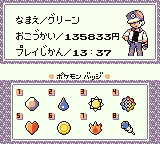
|

|

|
|---|---|---|
| G | RB | Y |

|

|
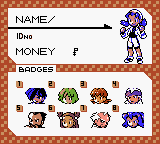
|
| GS | C (Male) | C (Female) |
Game Boy Advance

|
This section is incomplete. Please feel free to edit this section to add missing information and complete it. Reason: Female cards for RSE and FRLG |
| File:Trainer Card E.png | 
|
File:Trainer Card FRLG.png |
|---|---|---|
| RSE (Male) | E Frontier Pass | FRLG (Male) |
Nintendo DS
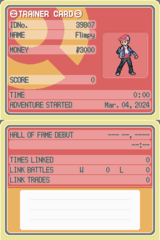
|
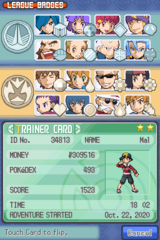
|
File:Trainer Card BW.png | 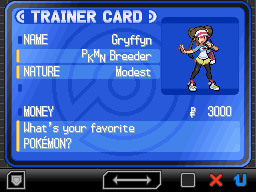
|
|---|---|---|---|
| DPPt | HGSS | BW | B2W2 |
Nintendo 3DS
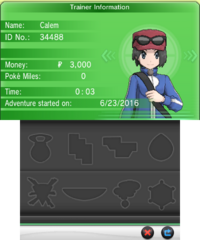
|
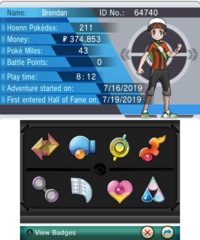
|
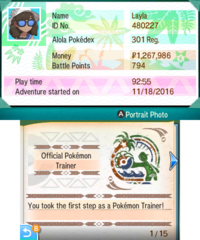
|
|---|---|---|
| XY | ORAS | SMUSUM |
Nintendo Switch
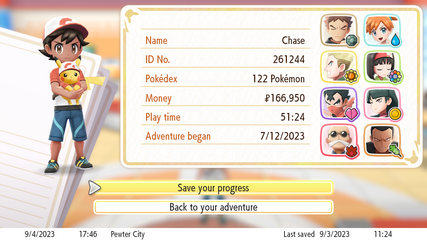
|
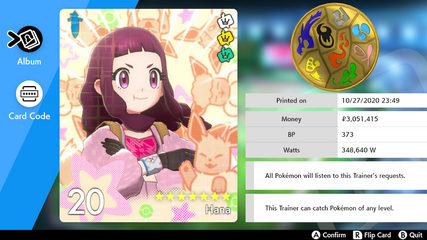
|
|---|---|
| LGPE | SwSh League Card |

|
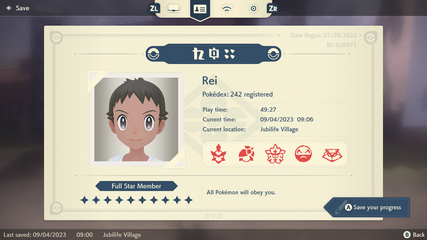
|
| BDSP | LA |
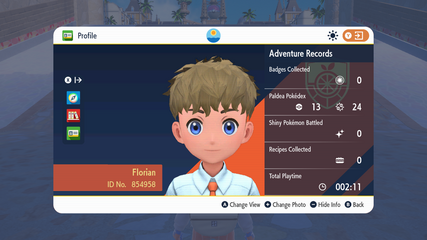
| |
| SV |
Applications
Stars
- Main article: Trainer Card level
Trainer Card levels were introduced in Generation III, and increase when specific achievements are performed. The Trainer Card changes color depending on the number of achievements completed, which may be done in any order.
Score
In Generation IV, the Trainer Card also carries the Trainer's score. A Trainer's score offers no specific purpose in the game and appears to be only aesthetic. The score begins at zero and increases every time a score-altering event occurs.
| Event | Change |
|---|---|
| Berry is pickedDPPt | +1 |
| Battled against a wild Pokémon | +2 |
| Battled against a Pokémon Trainer | +3 |
| Pokémon Egg is hatched | +7 |
| Pokémon is traded | +10 |
| Pokémon is evolved | +20 |
| Flag is obtained in the UndergroundDPPt | +34 |
Stickers
In Pokémon FireRed and LeafGreen, the Braggart on Four Island hands out Stickers to Trainers who tell him about their achievements. The Stickers are applied to the back of the Trainer Card, in the top-left, and are colored red, blue, yellow, or gray (depending on the number of times that the player has made that particular achievement).
| Requirement | Level 1 | Level 2 | Level 3 | Level 4 |
|---|---|---|---|---|
| Enter the Hall of Fame | 1 | 40 | 100 | 200 |
| Hatch a Pokémon Egg | 1 | 100 | 200 | 300 |
| Win a Link Battle | 1 | 20 | 50 | 100 |
| Level 1 | Level 2 | Level 3 | Level 4 |
|---|---|---|---|
Stamps

|
This section is incomplete. Please feel free to edit this section to add missing information and complete it. Reason: sprite of Sun Pokedex Completion |
In Generation VII, these stamps take the place of Badges, Trainer star achievements and the diploma in the Alola region.
| Stamp | Requirement | Location |
|---|---|---|
| File:Official Pokemon Trainer Completion Stamp.png Official Pokémon Trainer |
Default with Passport after choosing a first partner Pokémon | Iki Town |
 Melemele Trial Completion |
Pass Hala's grand trial | Iki Town |
 Akala Trial Completion |
Pass Olivia's grand trial | Ruins of Life |
 Ula'ula Trial Completion |
Pass Nanu's grand trial | Malie City |
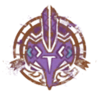 Poni Trial Completion |
Pass Hapu's grand trial | Vast Poni CanyonSM / Exeggutor IslandUSUM |
 Island Challenge Completion |
Become Champion | Pokémon League |
 Melemele Pokédex Completion |
Complete the Melemele Pokédex | Heahea City (Game Freak office) |
 Akala Pokédex Completion |
Complete the Akala Pokédex | Heahea City (Game Freak office) |
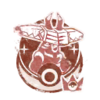 Ula'ula Pokédex Completion |
Complete the Ula'ula Pokédex | Heahea City (Game Freak office) |
 Poni Pokédex Completion |
Complete the Poni Pokédex | Heahea City (Game Freak office) |
| File:Trainer Passport stamp 11 Su.png Alola Pokédex CompletionSUS |
Complete the Alola Pokédex (not counting Magearna, Marshadow and ZeraoraUSUM) | Heahea City (Game Freak office) |
 Alola Pokédex CompletionMUM | ||
 50 Consecutive Single Battle Wins |
Achieve a 50-win streak in the Battle Tree's Single Battle format | Battle Tree |
 50 Consecutive Double Battle Wins |
Achieve a 50-win streak in the Battle Tree's Double Battle format | Battle Tree |
 50 Consecutive Multi Battle Wins |
Achieve a 50-win streak in the Battle Tree's Multi Battle format | Battle Tree |
| File:Poke Finder Pro Completion Stamp.png Poké Finder Pro |
Obtain the final version of the Poké Finder | Any Poké Finder spot* |
In the anime

Trainer Cards do not appear in the anime; Trainers are instead identified via their Pokédexes. Each has another license, called the Pokémon Trainer's license. Applicants must be 10 years of age or older to obtain these licenses. Trainers keep their Badges pinned on their clothing or in protected cases.
In The Symbol Life, Ash obtained the Frontier Pass, referred to as the "Frontierfolio", from Noland as a case to hold his Frontier Symbols in.
In the manga

Pokémon Adventures
Emerald arc
In Interesting Interactions Involving Illumise, Emerald was revealed to own a Frontier Pass. Throughout this arc, he added his newest Frontier Symbol to it whenever he earned one.
In other languages
Trainer Card
| |||||||||||||||||||||||||||||||||||||||||
Trainer Case
| |||||||||||||||||||||
Trainer Passport
| ||||||||||||||||||||||||||
Frontier Pass
| |||||||||||||||||||||
See also
References
- ↑ Gym guide, Sunyshore City: "Let me check out your Trainer Case. Let’s see how many Badges you have." (Pokémon Diamond, Pearl, and Platinum)
- ↑ Gym guide, Sunyshore City: "Let me check out your Trainer Case and see how many Badges you have..." (Pokémon Brilliant Diamond and Shining Pearl)
External links
| |||||||

|
This item article is part of Project ItemDex, a Bulbapedia project that aims to write comprehensive articles on all items. |
